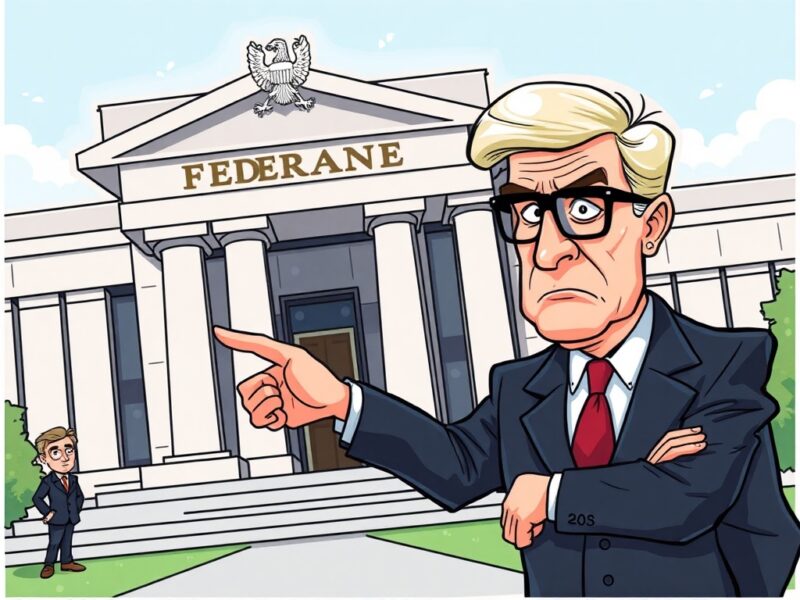Fidelity Bitcoin ETF Sees Astounding $120M Investment from Cantor Fitzgerald Family
BitcoinWorld
Fidelity Bitcoin ETF Sees Astounding $120M Investment from Cantor Fitzgerald Family
The cryptocurrency world is currently witnessing a significant shift, as traditional finance continues its embrace of digital assets. A recent headline-grabbing development involves the family office of Cantor Fitzgerald, a globally recognized investment bank. They have made a remarkable $120 million investment into the Fidelity Bitcoin ETF (FBTC), marking a pivotal moment for institutional confidence in spot Bitcoin exchange-traded funds.
Why is This Fidelity Bitcoin ETF Investment a Game Changer?
This substantial financial commitment by a firm closely associated with U.S. Commerce Secretary Howard Lutnick, through his family, carries immense weight. Cointelegraph initially reported this pivotal move, which strongly signals the increasing mainstream acceptance of cryptocurrencies, especially Bitcoin, as a legitimate and valuable asset class.
Cantor Fitzgerald, with its long and distinguished history on Wall Street, now holds a direct stake in this significant Fidelity Bitcoin ETF position. Howard Lutnick, who succeeded Bernard Gerald Cantor as chairman, transferred company ownership to his children after his appointment as commerce secretary, ensuring the family’s continued strategic involvement in the firm’s direction.
It is also interesting to note that Cantor Fitzgerald’s broader portfolio includes a substantial $170 million worth of Robinhood shares. This demonstrates a wider strategic interest in financial platforms that cater to evolving investment trends, including digital assets. The firm’s recent dive into FBTC is a clear, bold step towards strategic diversification into the burgeoning digital asset sector.
What Attracts Major Institutions to Bitcoin ETFs?
The introduction of spot Bitcoin ETFs in the U.S. truly revolutionized how institutional investors approach the crypto market. These regulated investment products offer a familiar and highly accessible pathway for gaining exposure to Bitcoin without the complexities of direct cryptocurrency ownership.
Consider the benefits that draw in large entities like the Cantor Fitzgerald family:
- Regulatory Clarity: Products like the Fidelity Bitcoin ETF operate within established regulatory frameworks, providing a layer of security and compliance that traditional investment vehicles offer. This makes them significantly more appealing than navigating the complexities of direct crypto purchases.
- Simplified Access: Investors can gain Bitcoin exposure through their existing brokerage accounts, eliminating the need for new wallets, private key management, or concerns about digital asset custody.
- Enhanced Liquidity: ETFs typically offer high liquidity, allowing for easier entry and exit from positions, which is crucial for large-scale investors managing substantial portfolios.
These factors collectively reduce the barriers to entry for institutional capital, paving the way for larger allocations into the crypto space.
The Ripple Effect: Broader Impact of Fidelity Bitcoin ETF Adoption
This $120 million investment from the Cantor Fitzgerald family is far more than just a single transaction; it represents a powerful endorsement. When established financial players with a reputation for astute investment commit such significant capital, it often inspires other traditional institutions to seriously reconsider their positions on digital assets.
This move could very well catalyze a “domino effect,” potentially leading to even more capital flowing into various Bitcoin ETFs, including the popular Fidelity Bitcoin ETF. This increased institutional adoption is vital for the maturation of the cryptocurrency market, bringing with it greater stability, deeper liquidity, and enhanced legitimacy.
Such substantial investments also strongly reinforce Bitcoin’s evolving position as a valuable asset within diversified investment portfolios. As more traditional firms allocate capital, it solidifies the narrative of Bitcoin as a legitimate long-term store of value, often referred to as “digital gold.”
What’s Next for Institutional Crypto Investment?
The entry of major players like the Cantor Fitzgerald family into the Fidelity Bitcoin ETF space paints a promising picture for the future of institutional crypto adoption. We can confidently anticipate continued and growing interest from various financial sectors as the market matures and regulatory clarity becomes even more pronounced.
This ongoing trend is highly likely to drive further innovation in crypto-related financial products, making digital assets even more accessible and attractive to a wider range of investors globally. The transparency and regulatory oversight inherent in spot ETFs are undoubtedly key factors attracting this new wave of significant capital.
Ultimately, this astounding investment from a prominent financial family underscores the burgeoning confidence in Bitcoin’s long-term potential. It highlights a clear and irreversible shift in how traditional finance views, evaluates, and integrates digital assets into their core investment strategies.
The Cantor Fitzgerald family’s substantial $120 million investment in the Fidelity Bitcoin ETF is indeed a landmark event for the cryptocurrency ecosystem. It powerfully demonstrates the increasing institutional comfort and conviction in Bitcoin as a viable and attractive asset class. This bold move by a respected financial entity not only validates Bitcoin but also paves the way for even greater mainstream adoption, further cementing Bitcoin’s crucial place in the evolving landscape of global finance.
Frequently Asked Questions (FAQs)
What is the Fidelity Bitcoin ETF (FBTC)?
The Fidelity Bitcoin ETF (FBTC) is a spot Bitcoin exchange-traded fund that allows investors to gain exposure to Bitcoin’s price movements without directly holding the cryptocurrency. It is managed by Fidelity, a well-known financial services corporation.
Who is Cantor Fitzgerald, and why is their investment significant?
Cantor Fitzgerald is a prominent global financial services firm, known for its investment banking and brokerage services. Their $120 million investment in FBTC is significant because it signals strong institutional confidence in Bitcoin and regulated crypto products, potentially encouraging other major players to follow suit.
How does this investment relate to U.S. Commerce Secretary Howard Lutnick?
Howard Lutnick is the chairman of Cantor Fitzgerald. After his appointment as U.S. Commerce Secretary, he transferred ownership of the company to his children. The investment was made by the Cantor Fitzgerald family office, maintaining a close connection to the influential figure and the firm.
What are the main benefits of investing in a spot Bitcoin ETF for institutions?
Spot Bitcoin ETFs offer institutions several benefits, including regulatory clarity, simplified access through existing brokerage accounts, and enhanced liquidity. They remove the complexities of direct crypto ownership, such as custody and security, making large-scale investments more manageable and compliant.
Will this investment lead to more institutional adoption of Bitcoin?
Yes, it is highly likely. Significant investments from respected firms like Cantor Fitzgerald often serve as a strong endorsement, building confidence among other traditional institutions. This can catalyze further capital flow into Bitcoin ETFs and the broader crypto market, accelerating mainstream adoption.
Did you find this analysis of Cantor Fitzgerald’s significant investment in the Fidelity Bitcoin ETF insightful? Share this article with your network and join the conversation about the future of institutional crypto adoption!
To learn more about the latest Bitcoin trends, explore our article on key developments shaping Bitcoin institutional adoption.
This post Fidelity Bitcoin ETF Sees Astounding $120M Investment from Cantor Fitzgerald Family first appeared on BitcoinWorld and is written by Editorial Team
You May Also Like

Fed Governor Lisa Cook Under Fire: DOJ Official Urges Powell to Act

PA Daily | Binance HODLer airdrop launched on Haedal; Texas Legislature passed Bitcoin Reserve Bill and is waiting for the governor to sign it into law
